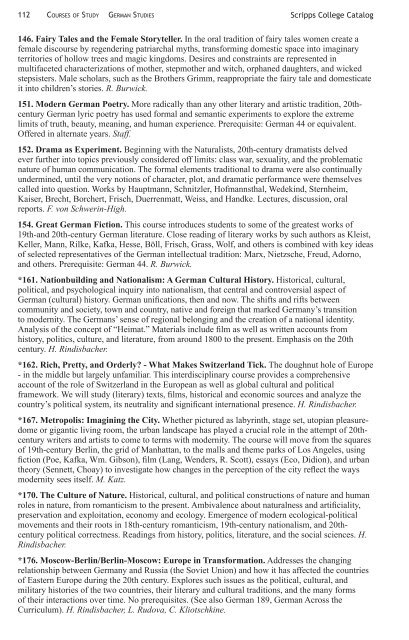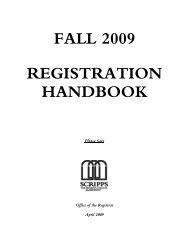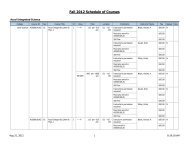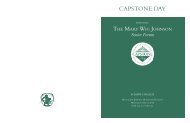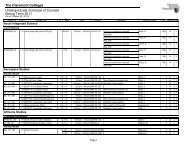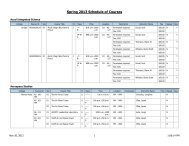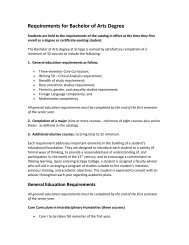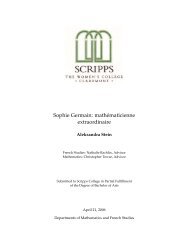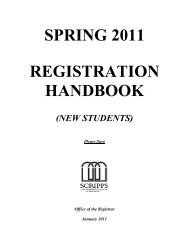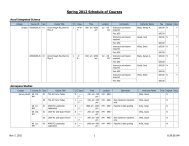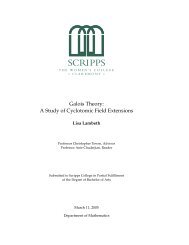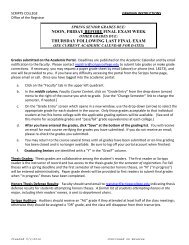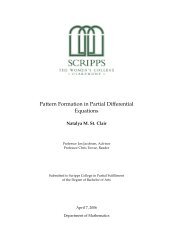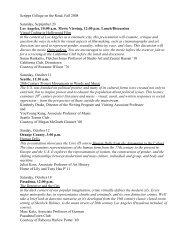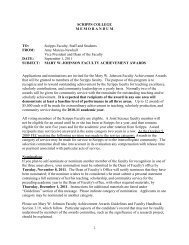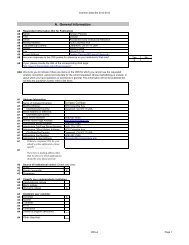PDF of the 2012-2013 Academic Catalog - Scripps College
PDF of the 2012-2013 Academic Catalog - Scripps College
PDF of the 2012-2013 Academic Catalog - Scripps College
Create successful ePaper yourself
Turn your PDF publications into a flip-book with our unique Google optimized e-Paper software.
112 Courses <strong>of</strong> Study German Studies <strong>Scripps</strong> <strong>College</strong> <strong>Catalog</strong><br />
146. Fairy Tales and <strong>the</strong> Female Storyteller. In <strong>the</strong> oral tradition <strong>of</strong> fairy tales women create a<br />
female discourse by regendering patriarchal myths, transforming domestic space into imaginary<br />
territories <strong>of</strong> hollow trees and magic kingdoms. Desires and constraints are represented in<br />
multifaceted characterizations <strong>of</strong> mo<strong>the</strong>r, stepmo<strong>the</strong>r and witch, orphaned daughters, and wicked<br />
stepsisters. Male scholars, such as <strong>the</strong> Bro<strong>the</strong>rs Grimm, reappropriate <strong>the</strong> fairy tale and domesticate<br />
it into children’s stories. R. Burwick.<br />
151. Modern German Poetry. More radically than any o<strong>the</strong>r literary and artistic tradition, 20thcentury<br />
German lyric poetry has used formal and semantic experiments to explore <strong>the</strong> extreme<br />
limits <strong>of</strong> truth, beauty, meaning, and human experience. Prerequisite: German 44 or equivalent.<br />
Offered in alternate years. Staff.<br />
152. Drama as Experiment. Beginning with <strong>the</strong> Naturalists, 20th-century dramatists delved<br />
ever fur<strong>the</strong>r into topics previously considered <strong>of</strong>f limits: class war, sexuality, and <strong>the</strong> problematic<br />
nature <strong>of</strong> human communication. The formal elements traditional to drama were also continually<br />
undermined, until <strong>the</strong> very notions <strong>of</strong> character, plot, and dramatic performance were <strong>the</strong>mselves<br />
called into question. Works by Hauptmann, Schnitzler, H<strong>of</strong>mannsthal, Wedekind, Sternheim,<br />
Kaiser, Brecht, Borchert, Frisch, Duerrenmatt, Weiss, and Handke. Lectures, discussion, oral<br />
reports. F. von Schwerin-High.<br />
154. Great German Fiction. This course introduces students to some <strong>of</strong> <strong>the</strong> greatest works <strong>of</strong><br />
19th-and 20th-century German literature. Close reading <strong>of</strong> literary works by such authors as Kleist,<br />
Keller, Mann, Rilke, Kafka, Hesse, Böll, Frisch, Grass, Wolf, and o<strong>the</strong>rs is combined with key ideas<br />
<strong>of</strong> selected representatives <strong>of</strong> <strong>the</strong> German intellectual tradition: Marx, Nietzsche, Freud, Adorno,<br />
and o<strong>the</strong>rs. Prerequisite: German 44. R. Burwick.<br />
*161. Nationbuilding and Nationalism: A German Cultural History. Historical, cultural,<br />
political, and psychological inquiry into nationalism, that central and controversial aspect <strong>of</strong><br />
German (cultural) history. German unifications, <strong>the</strong>n and now. The shifts and rifts between<br />
community and society, town and country, native and foreign that marked Germany’s transition<br />
to modernity. The Germans’ sense <strong>of</strong> regional belonging and <strong>the</strong> creation <strong>of</strong> a national identity.<br />
Analysis <strong>of</strong> <strong>the</strong> concept <strong>of</strong> “Heimat.” Materials include film as well as written accounts from<br />
history, politics, culture, and literature, from around 1800 to <strong>the</strong> present. Emphasis on <strong>the</strong> 20th<br />
century. H. Rindisbacher.<br />
*162. Rich, Pretty, and Orderly? - What Makes Switzerland Tick. The doughnut hole <strong>of</strong> Europe<br />
- in <strong>the</strong> middle but largely unfamiliar. This interdisciplinary course provides a comprehensive<br />
account <strong>of</strong> <strong>the</strong> role <strong>of</strong> Switzerland in <strong>the</strong> European as well as global cultural and political<br />
framework. We will study (literary) texts, films, historical and economic sources and analyze <strong>the</strong><br />
country’s political system, its neutrality and significant international presence. H. Rindisbacher.<br />
*167. Metropolis: Imagining <strong>the</strong> City. Whe<strong>the</strong>r pictured as labyrinth, stage set, utopian pleasuredome<br />
or gigantic living room, <strong>the</strong> urban landscape has played a crucial role in <strong>the</strong> attempt <strong>of</strong> 20thcentury<br />
writers and artists to come to terms with modernity. The course will move from <strong>the</strong> squares<br />
<strong>of</strong> 19th-century Berlin, <strong>the</strong> grid <strong>of</strong> Manhattan, to <strong>the</strong> malls and <strong>the</strong>me parks <strong>of</strong> Los Angeles, using<br />
fiction (Poe, Kafka, Wm. Gibson), film (Lang, Wenders, R. Scott), essays (Eco, Didion), and urban<br />
<strong>the</strong>ory (Sennett, Choay) to investigate how changes in <strong>the</strong> perception <strong>of</strong> <strong>the</strong> city reflect <strong>the</strong> ways<br />
modernity sees itself. M. Katz.<br />
*170. The Culture <strong>of</strong> Nature. Historical, cultural, and political constructions <strong>of</strong> nature and human<br />
roles in nature, from romanticism to <strong>the</strong> present. Ambivalence about naturalness and artificiality,<br />
preservation and exploitation, economy and ecology. Emergence <strong>of</strong> modern ecological-political<br />
movements and <strong>the</strong>ir roots in 18th-century romanticism, 19th-century nationalism, and 20thcentury<br />
political correctness. Readings from history, politics, literature, and <strong>the</strong> social sciences. H.<br />
Rindisbacher.<br />
*176. Moscow-Berlin/Berlin-Moscow: Europe in Transformation. Addresses <strong>the</strong> changing<br />
relationship between Germany and Russia (<strong>the</strong> Soviet Union) and how it has affected <strong>the</strong> countries<br />
<strong>of</strong> Eastern Europe during <strong>the</strong> 20th century. Explores such issues as <strong>the</strong> political, cultural, and<br />
military histories <strong>of</strong> <strong>the</strong> two countries, <strong>the</strong>ir literary and cultural traditions, and <strong>the</strong> many forms<br />
<strong>of</strong> <strong>the</strong>ir interactions over time. No prerequisites. (See also German 189, German Across <strong>the</strong><br />
Curriculum). H. Rindisbacher, L. Rudova, C. Kliotschkine.


